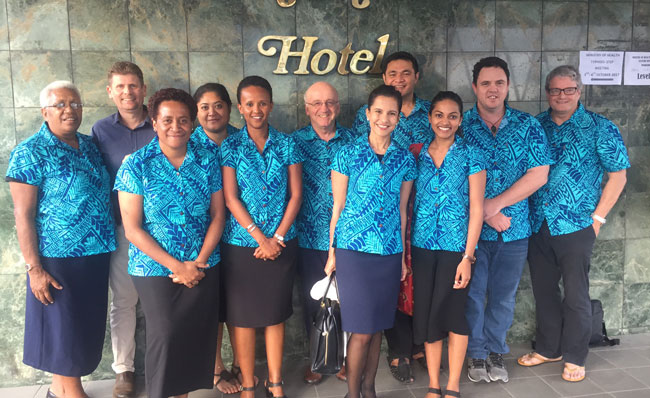 Tuesday 26 June 2018 9:45am
Tuesday 26 June 2018 9:45am
Some of the team members involved in the collaborative research into the cause of typhoid fever in Fiji include: (from back left) Varanisese Rosa, Ministry of Health Fiji; Professor John Crump, Otago Global Health Institute, University of Otago; Florence Masinini, Ministry of Health Fiji; Professor Kim Mulholland, Murdoch Childrens' Research Institute, University of Melbourne; Dr Daniel Faktaufon, Ministry of Health Fiji; Dr Aaron Jenkins, Edith Cowan University and University of Sydney; Professor Richard Strugnell, University of Melbourne.
(Front, from left) Silivia Matanitobua, Ministry of Health, Fiji; Dr Aneley Getahun, Fiji National University and Ministry of Health, Fiji; Dr Aalisha Sahu-Khan, Ministry of Health Fiji; Namrata Prasad, Centre for International Health, University of Otago.
University of Otago researchers have been key partners in a study which has found poor sanitation facilities appear to be a major source of Salmonella Typhi, the cause of typhoid fever, in Fiji.
Typhoid fever is endemic in Fiji with the country experiencing an increase in the disease over the past decade. The research identified that transmission is predominantly through consumption of contaminated surface water and unwashed produce, Co-Director of the Otago Global Health Institute Professor John Crump says.
The research concludes that improved sanitation facilities and protection of surface water sources and produce from contamination by human feces are likely to contribute to typhoid control in Fiji.
Namrata Prasad, a Fijian and Masters of Public Health graduate from the University of Otago was the first joint author of the paper and led the analysis of the study, just published in leading tropical medicine journal PLoS Neglected Tropical Diseases.
Professor Crump, an international typhoid fever expert who oversaw the study design, says the study is important because typhoid fever is a substantial cause of morbidity and mortality in many low and middle-income countries and Oceania is now the global region thought to have the highest typhoid fever incidence.
The study is believed to be the first to investigate sources and modes of transmission for typhoid fever in Fiji. Most previous research on typhoid fever risk factors has been done in Asia and demonstrates considerable variation in major sources and modes of transmission by location.
“We are delighted to help shed light on the neglected problem of typhoid fever in Oceania,” Professor Crump says.
“Even more to be able to provide evidence to inform much-needed non-vaccine control measures.”
Professor Crump says the research also highlights the serious concern that Oceania has fallen behind both Asia and sub-Saharan Africa to become the region with the lowest coverage of improved drinking water and improved sanitation.
The results show typhoid to be common among both the rural and urban population in Fiji. People without access to improved sanitation facilities or with damaged “improved” sewerage systems were at particular risk. Those with typhoid fever were more likely to have someone within their household build their toilet. In Fiji a common “improvement” to sewerage systems is use of buried steel drums as the receptacle for sewage. Such receptacles are subject to flooding, corrosion and leakage, leading to contamination of surface water and crops by human feces.
Related research has shown that gardens of patients with typhoid fever were more often positioned closer to the household toilet or septic tank than in control households and the majority of cases propagated vegetables directly on or below the toilet drainage area.
“In contrast to water-related factors, poor sanitation has seldom been identified as a risk factor for typhoid fever, highlighting the value of our local research,” the research paper states.
The study was a collaboration of international researchers and Otago Global Health Institute Leadership Group member responsible for Pacific engagement and relationships, Dr Patrick Vakaoti, is happy with the outcome.
“As a Fijian, I am very happy to see University of Otago scientists collaborating effectively with the Fijian Ministry of Health and Fiji National University, as well as the University of Melbourne and Edith Cowan University on a health problem of regional concern,” Dr Vakaoti says.
“Such partnerships are vital to understand and address health issues in Pacific countries challenged by more limited resources and research capacity.”
For further information, please contact:
Professor John Crump
Co-Director Otago Global Health Institute, University of Otago
Tel 3 479 9460
Email john.crump@otago.ac.nz
Liane Topham-Kindley
Senior Communications Adviser
Tel 3 479 9065
Mob 21 279 9065
Email liane.topham-kindley@otago.ac.nz
A list of Otago experts available for media comment is available elsewhere on this website.
Electronic addresses (including email accounts, instant messaging services, or telephone accounts) published on this page are for the sole purpose of contact with the individuals concerned, in their capacity as officers, employees or students of the University of Otago, or their respective organisation. Publication of any such electronic address is not to be taken as consent to receive unsolicited commercial electronic messages by the address holder.